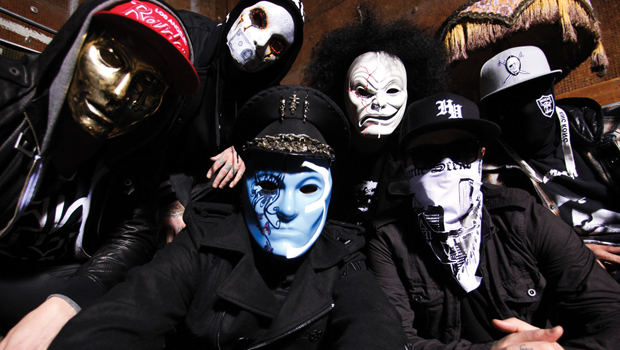Interview: Guitarist J-Dog of Hollywood Undead on Recording and Songwriting
All the latest guitar news, interviews, lessons, reviews, deals and more, direct to your inbox!
You are now subscribed
Your newsletter sign-up was successful

Hollywood Undead’s latest release, American Tragedy, debuted at No. 4 and sold 70,000 copies during its first week of release in April.
Impressive numbers for a second album, but not entirely surprising. As a new band, Hollywood Undead built an online presence via MySpace several years ago, setting up the foundation for their first album, Swan Songs A&M/Octone), which was released in 2008 and surprised both band and label with its chart longevity.
Next week, guitarist J-Dog, vocalist Johnny 3 Tears, guitarist/vocalist Charlie Scene, drummer Da Kurlzz, vocalist Funny Man and vocalist/guitarist Danny will join Avenged Sevenfold, Black Veil Brides and Asking Alexandria on the Buried Alive tour.
J-Dog phoned in to talk about the diverse sounds that come together as Hollywood Undead.
The album covers a range of styles, from “Comin’ In Hot” to “My Town,” to “Bullet.” Where do the guitars fit into this?
We have three guitar players and we don’t all play at the same time. I think every song we play live right now has guitar, so when one person has to step up and do all the harmony, someone else plays. We switch it off so that we can rock as good as possible. We carry two guitars each, so six total, and two basses and we have different tunings as well. We keep the show really exciting. I always enjoyed watching musicians switch instruments.
When a song starts coming together, are there times when you listen and wonder what you’re going to do with it?
All the latest guitar news, interviews, lessons, reviews, deals and more, direct to your inbox!
It’s a blessing and a curse because there’s different writers in this band, so sometimes when you’re stuck you can go to the other writer and ask, “What do you think should go here?” Sometimes it fits in perfect and you wouldn’t have thought of it because they have a different style of writing. Sometimes it sucks because they want it to go there and you don’t. Sometimes it works out really well and sometimes it doesn’t, just like any band with a lot of writers, but we figure it out. Different people write different styles of songs and that’s what shows up on the record.
Does the end result sometimes surprise you?
Oh yeah. Sometimes we start a song and then say we’re done and I’ll say, “I never imagined that the song would be like that or that it would change that much.”
At what point did you begin to find your groove as a band and understand each person’s strengths and weaknesses?
That’s a good question. It’s hard to say, because I don’t know that we’ll ever be 100 percent into that groove. There’s always going to be disagreements, and this and that, and some people want to do one thing and some people don’t, so it’s still like that; we just don’t fight as much. It took a good year, through the first album, to feel each other out, but we’re still not 100 percent there yet.
How are the parts determined and how do the different styles come together to create Hollywood Undead?
It starts in the writing process, when someone sits with a guitar and writes a chorus or a melody. We record it, and the person who wrote it is usually the one who plays it onstage, so the song comes across with that person’s style. It’s cool, though, because we all play a little different, and on different songs we’re playing guitars on different parts, so it’s entertaining to watch. Charlie Scene likes playing solos between parts that aren’t on the record; he thinks it’s funny.
Danny plays more aggressive. He comes from a background of playing bass, so he’s more groovy. I just kind of jump around and fuck up a bunch, so it’s three totally different guitar-playing styles. I like to see bands that do that. I like to see different players and what they can play. It’s entertaining to me. It’s inspiration. I play guitar, bass, keyboard and do vocals and I’m not great at any one of them, but I know enough to play. People come up to me after shows and say, “I had no idea you played so many instruments.” It’s really not that hard, but half the dudes in this band play everything I play, if not better, so it’s cool that the crowd gets to see that, because kids don’t expect it. They think we’re just a bunch of people with an iPod, jumping around, and that’s not the case at all.
Don Gilmore produced Swan Songs and much of American Tragedy. How difficult was it to find a producer who understood what this band is about?
It was kind of hard. We tried several different people, and people like to stick with one genre, especially producers. Don did Linkin Park’s records; he did a lot of bands that were not necessarily similar to us, but he understood where we were coming from. It was difficult to find someone who knows how to do electronic programming, beats, and make guitars sound really good.
Most producers can make melodies and beats, but they have no idea how to tune a guitar and get a good sound out of the amp. Or they know how to get a crazy amp sound and crazy bass sound and live drums, but they have no idea about synthesizers and they get lost in the mix. But Don knows the best of both worlds and that worked out for us.
American Tragedy Redux by Hollywood Undead will be released November 21 via A&M/Octone Records.
— Alison Richter
Alison Richter interviews artists, producers, engineers and other music industry professionals for print and online publications. Read more of her interviews right here.
Alison Richter is a seasoned journalist who interviews musicians, producers, engineers, and other industry professionals, and covers mental health issues for GuitarWorld.com. Writing credits include a wide range of publications, including GuitarWorld.com, MusicRadar.com, Bass Player, TNAG Connoisseur, Reverb, Music Industry News, Acoustic, Drummer, Guitar.com, Gearphoria, She Shreds, Guitar Girl, and Collectible Guitar.
